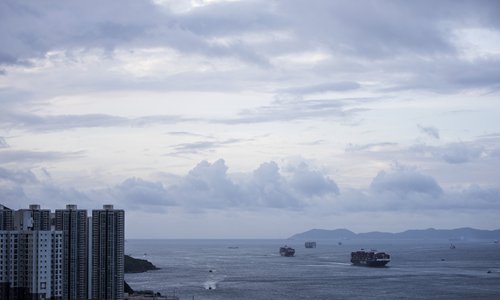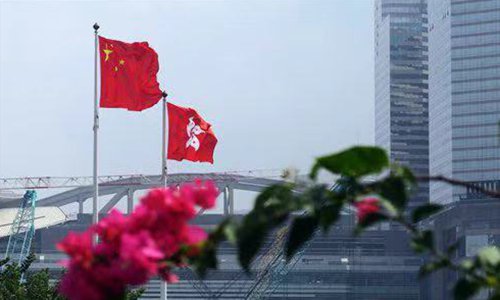HOME >> CHINA,SPECIAL-COVERAGE
Fitch’s downgrade of HK marks economic aggression; mainland stands ready to help
By Wang Cong in Hong Kong and Chen Qingqing in Beijing Source:Global Times Published: 2019/9/8 0:26:27

Photo:VCG
Ask anyone among the older generations in Hong Kong about the economic relationship between the Chinese mainland and the special administrative region (SAR), they will keenly share countless stories of mutual support uplifting each other over the years through hardships.
But one, in particular, stands out about how the mainland helped the city in beating back foreign profiteers in the late 1990s. For many, it was a moment of clarity for the shared destiny as Hong Kong had just reunited with its motherland after being a long time British colony.
More than two decades later, as the city grapples with months of political unrest, foreign profiteers, who seek to take advantage from others' miseries, appeared to be poised to strike again. This was evident with US credit ratings agency Fitch Ratings Inc on Thursday downgrading Hong Kong as a long-term foreign currency debt issuer.
Only difference is that this time, they are facing a much more resilient Hong Kong economy and an ever more powerful Chinese mainland, which stands ready to help the HKSAR in defending itself against any aggression, political or economic, officials and business leaders said.
Foreign aggression
Completely disregarding the HKSAR government's robust efforts in containing the riots from damaging the core values of Hong Kong and in stabilizing the economy, Fitch lowered Hong Kong's rating to AA from AA+ and hinted bearish view on its growth.
Fitch's move to focus on speculations of the implementation of the "one country, two systems" model that governs Hong Kong drew immediate push back from officials in Hong Kong.
Paul Chan, Hong Kong Financial Secretary, criticized Fitch's downgrading of Hong Kong, calling it "purely speculative and groundless" on Friday.
"I must point out that, since Hong Kong's return to the motherland, the Basic Law has provided a strong safeguard to the 'one country, two systems' principle and the continued prosperity of [HKSAR]," he said in a statement to the Global Times, noting that Hong Kong's deeper economic and financial ties with the mainland should not be a rating constraint, but a positive driver for the city's long-term development.
Fitch's move on Thursday followed constant interference in Hong Kong affairs by foreign officials, particularly those in the US and the UK. Officials such as Nancy Pelosi, speaker of the US House of Representatives, and Mike Pompeo, US Secretary of State, have praised the violence that persisted on the streets of Hong Kong and rattled residents.
The pattern of US politicians sowing chaos in foreign soil, from Europe to the Middle East, only to pave the way for US profiteers has been long known and that Fitch's move on Thursday might be yet another step toward that direction, analysts said.
"The current situation in Hong Kong offered an excuse for Fitch's downgrading, which works in tandem with [the US'] political moves to hit confidence in Hong Kong," Li Xiaobing, an expert on Hong Kong, Macao and Taiwan working in the Nankai University in Tianjin, told the Global Times.
Fitch is not the only US company that has sought to undermine Hong Kong's economy. Some Western financial institutions and media outlets have expressed bearish views on Hong Kong, citing the political unrest while also fanning the flame at the same time. Another ratings agency, Moody's, also warned in July if social unrest continues in the city, it could adjust its credit rating of the city.

Photo: IC
Historic lesson
For many, this aggression by foreign profiteers brings back memories of a critical period in the late 1990s.
As residents of Hong Kong were celebrating their return to the motherland after more than a century of British rule, a financial storm, fueled by foreign speculators led by the notorious George Soros, was looming in Thailand. After hitting the Thai economy and currency hard, the storm quickly spread throughout Asia and as a major financial hub, Hong Kong also became a prime target.
"International speculators took a 'double manipulation' approach, simultaneously hitting the Hong Kong dollar and the Hong Kong stock market. With the help of the media with ulterior motives, the move led to a confidence crisis in the market about the Hong Kong dollar and Hong Kong's financial system," Norman Chan Tak-Lam, chief executive of the Hong Kong Monetary Authority, told the Global Times, recounting the dark period. "If we let the [activities] continue and sit idle, the Hong Kong dollar and the financial system could have crashed."
Facing such a danger, the HKSAR government took an unprecedented move to use the city's reserve to purchase stocks, thus directly hitting back at the speculators. But the move itself was a dangerous one because if the HKSAR reserve was not sufficient to retaliate the speculators, it meant a collapse of the Hong Kong economy, said Jonathan Choi Koon-shum, chairman of the Chinese General Chamber of Commerce.
"That's why the involvement of the central government was very important," Choi told the Global Times, adding that the People's Bank of China, the central bank, sent advisors to Hong Kong and offered full support to Hong Kong. "It was a beautiful war fought by the HKSAR with the help of the central government," he said.
Norman Chan also added that although Hong Kong proved to have had enough funds to hit back, the public support of the central government toward Hong Kong at a critical moment was appreciated. The central government made clear that "if Hong Kong needs, the central government will spare no efforts in preserving Hong Kong's prosperity and stability… at that moment, the central government was no doubt a powerful backing."
The decision by Hong Kong to use its foreign reserves was highly contentious and was criticized as a move that is against the free market principles and was not sustainable. But the central government's support acted as a shield toward such criticism.
The end result of that war was clear: the foreign profiteers was defeated and Hong Kong maintained its status as a global financial hub. However, two decades later, the foreign speculators seem to have not learned any lesson from that war. Not only did they not learn from that experience, they grossly underestimate the resilience of the Hong Kong economy as well as Beijing's unwavering support for the city, officials and analysts said.
Strong resilience
Since violent protests started two months ago, the central government has repeatedly expressed support for the chief executive and the HKSAR government to take effective measures under the law to stop violence and unrest.
At a press conference with German Chancellor Angela Merkel in Beijing on Friday, Premier Li Keqiang also reiterated the central government's support for the HKSAR government, saying, "the Chinese people have the capabilities and wisdom to handle our own affairs," Hong Kong-based newspaper Ta Kung Pao reported.
"At the moment, I think the central government will not step in yet because the Hong Kong economy has a solid foundation," Liang Haiming, an economist at the Hainan University, told the Global Times, noting that once violence stops, tourism will resume, new public offerings will return and foreign capital will surge.
Liang said that although the city endured some damages, "they are not life threatening" and the Guangdong-Hong Kong-Macao greater bay area development plan, under which Hong Kong is expected to play a vital role as the financial center, could help Hong Kong through the hardship.
Apart from the greater bay area plan, the central government has also laid out a slew of other efforts to help ensure long-term development in Hong Kong, including a prominent role in the Belt and Road Initiative and a recently announced plan to build Shenzhen, South China's Guangdong Province, into a global benchmark city.
The announcement of the Shenzhen plan sparked speculations that Hong Kong's role in the mainland's economic development has been diminished over the years and that the mainland could even sideline the HKSAR in wake of recent unrest. But such speculation is unfounded and does not reflect the shared interests between Hong Kong and the mainland, Liang said.
"If Hong Kong ceases to be an international financial center… many mainland companies will suffer and many in Hong Kong will lose their jobs. I don't think anyone wants to see such a situation," he said.
Norman Chan also added that Hong Kong's financial and banking system has built up strong buffer and resilience over the past years. "In recent months, Hong Kong's financial and banking systems, money and stock markets remained stable and operated in an orderly manner," he said.
Investors also appeared to have brushed aside the Fitch's downgrading of Hong Kong. On Friday, the Hong Seng index gained 0.66 percent, or 175 points, despite this downgrade.
RELATED ARTICLES:
Posted in: SOCIETY,FEATURE 2